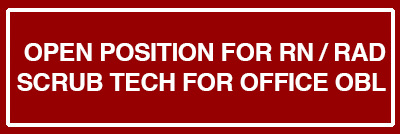Follow Us x
Myocardial Perfusion Stress Testing
What is it?
Myocardial Perfusion Stress Testing is a test that evaluates the pumping action and the blood flow to the heart muscle using a combination of imaging and exercise or medication induced stress on the heart.
Why you are having this procedure (symptoms/indications):
The test checks for evidence of blocked arteries that feed the heart muscle and shows if there is any problem with the way the heart handles stress.
Prep for the procedure:
It is important to not have anything to eat or drink besides water 4 hours before the test, and also please do not smoke for 4 hours. The other requirement is to avoid all caffeine for 24 hours and all decaffeinated drinks, as they do still contain small amounts of caffeine, i.e., coffee, tea and chocolate.
Please wear comfortable clothes and walking shoes; avoid overalls, coveralls, dresses and full-length slips as they may interfere with the testing procedure.Please bring a complete list of your medications and their dosages with you to the test. If you are prescribed any of the following medications, please do not take them the night before or the day of the test, unless instructed otherwise. If you take any medications from the list below, please bring them with you to take after the test.
Please wear comfortable clothes and walking shoes; avoid overalls, coveralls, dresses and full-length slips as they may interfere with the testing procedure.Please bring a complete list of your medications and their dosages with you to the test. If you are prescribed any of the following medications, please do not take them the night before or the day of the test, unless instructed otherwise. If you take any medications from the list below, please bring them with you to take after the test.
What to expect:
The test is lengthy, taking 3-4 hours to complete with most of it waiting. When you arrive, an IV access will be started and you will receive an injection of a radioactive tracer, Sestamibi. You will then wait an hour so the medicine has time to circulate. Sestamibi has no known side effects or allergic reactions, so you will not feel any differently.
Next, you will be positioned under the camera and pictures of your heart will be taken for approximately 20 minutes. You will lie on your back and be asked to be very still.
After this first set of pictures has been taken, you will undergo the stress portion of the test. If undergoing treadmill stressing, you will walk on a treadmill until a target heart rate has been achieved. A second injection of Sestamibi will then be put into your IV line, and you will be asked to walk an additional 2 minutes. A nurse will be present in order to monitor your heart rate and blood pressure as you exercise.
If undergoing pharmacological stressing, you will be given a medication through your IV line that will simulate the effects of exercise on your heart. These medicines - Adenosine, Lexiscan or Dobutamine - do have some mild side effects that will be explained to you. A nurse will be present in order to monitor your heart rate and blood pressure. This portion of the test will take from 10-30 minutes depending on the medication used.
After stressing, you will be given an hour break. You may eat, drink caffeine and smoke during this time. You may bring something from home if you would like.
Upon returning, a second set of pictures will be taken for 20 minutes. The test will then be complete, and you may leave.
Next, you will be positioned under the camera and pictures of your heart will be taken for approximately 20 minutes. You will lie on your back and be asked to be very still.
After this first set of pictures has been taken, you will undergo the stress portion of the test. If undergoing treadmill stressing, you will walk on a treadmill until a target heart rate has been achieved. A second injection of Sestamibi will then be put into your IV line, and you will be asked to walk an additional 2 minutes. A nurse will be present in order to monitor your heart rate and blood pressure as you exercise.
If undergoing pharmacological stressing, you will be given a medication through your IV line that will simulate the effects of exercise on your heart. These medicines - Adenosine, Lexiscan or Dobutamine - do have some mild side effects that will be explained to you. A nurse will be present in order to monitor your heart rate and blood pressure. This portion of the test will take from 10-30 minutes depending on the medication used.
After stressing, you will be given an hour break. You may eat, drink caffeine and smoke during this time. You may bring something from home if you would like.
Upon returning, a second set of pictures will be taken for 20 minutes. The test will then be complete, and you may leave.
Risks:
The amount of radiation you will be exposed to is comparable to that of a CAT (CT) scan which is considered a safe level. The test carries no risk for the patient with normal circulation. Some side effects may be irregular heartbeat, chest pain or EKG changes. People who have heart disease are at some slight risk at all times, and this test briefly increases their risk of heart disease complications. The benefits from taking this test include the possibility of finding evidence that the heart, lungs and circulation are performing normally rather than limited by disease. If evidence of abnormality is found, the test data will contribute to identifying the nature and extent of abnormality as an aid to the selection of appropriate treatment.
Post procedure instructions/limitations:
There are no limitations after the exam and you may resume normal activities. Your referring physician should have your test results in 4 working days. Any results requiring immediate action will be handled more quickly.






